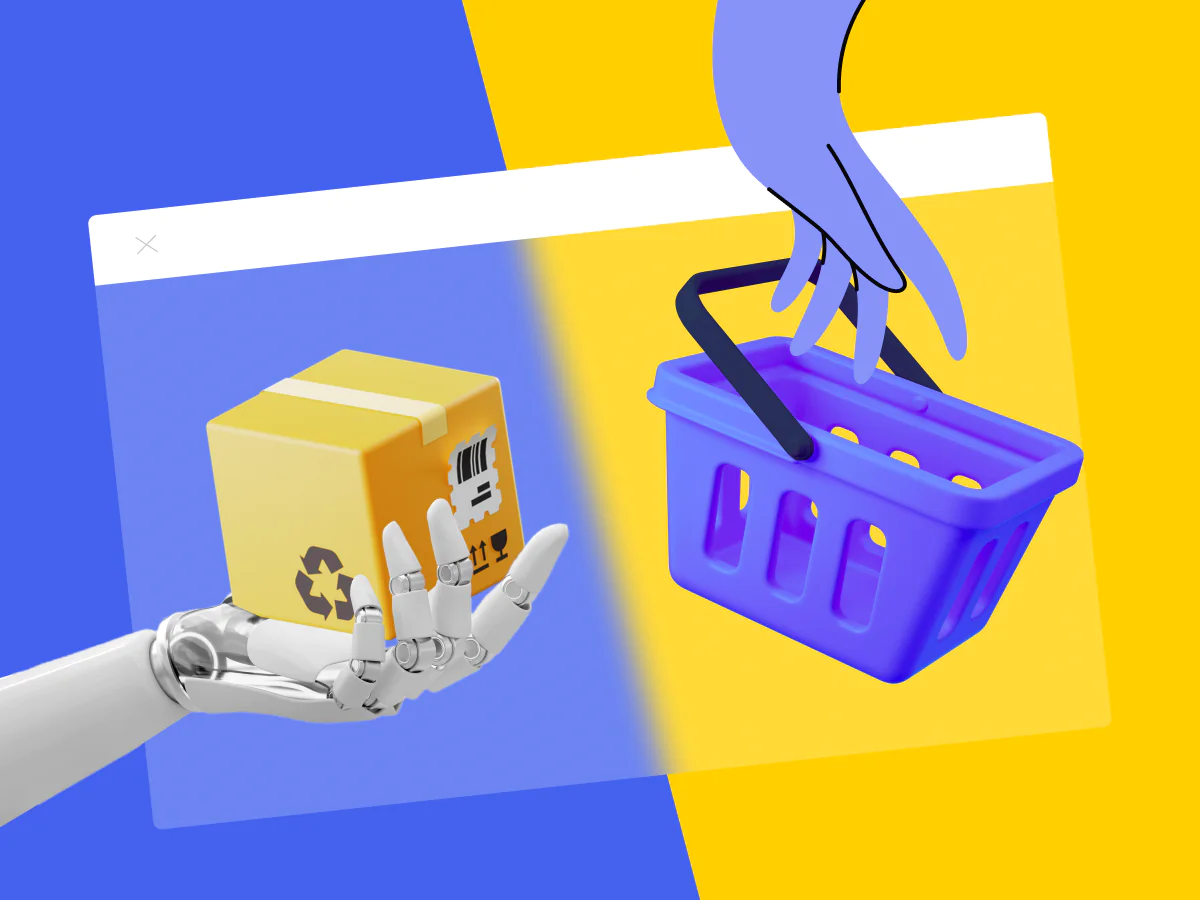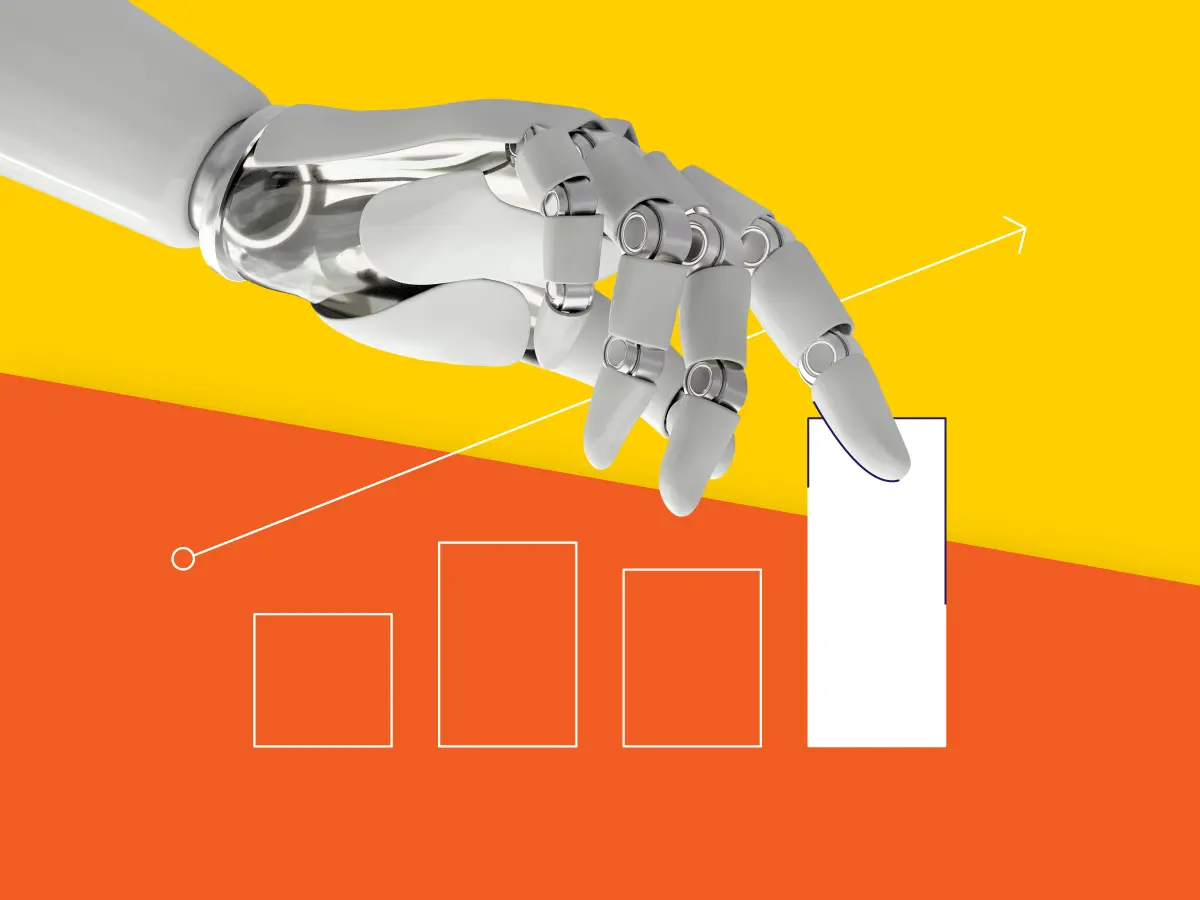Let’s face it, running an online business is not easy. Even if it’s a small or medium-sized one. You’re juggling inventory, marketing, customer service, and a million other tasks.
But what if there was a tool that could help you automate these tasks, personalize your customer experience, and increase your sales?
AI, or Artificial Intelligence, — the latest trend in ecommerce, — is offering affordable and accessible solutions.
Now, before you roll your eyes and think, “AI is too complicated for me,” or “I can’t afford it,” hear me out. It’s becoming a critical tool for businesses of all sizes.
Here’s a startling fact: only 15% of retailers currently use AI. But get this: experts predict the retail AI market will reach $20.05 billion by 2026. This growth is mainly driven by personalization and smart product recommendations.

The best part?
You don’t have to be a technical genius to use AI. There are many easy-to-use, affordable tools.
In this article, we’ll look at AI in e-commerce examples and discover how the latest technology can help your business.
Main benefits of Artificial Intelligence (AI) in e-commerce for companies
For years, people have been looking for ways to make shopping easier and convenient.
Guess what? E-stores have come to the rescue.
From the comfort of your home, you can browse all sorts of products, pay for them with a few clicks, and have them delivered right to your doorstep.
Online shopping has become incredibly popular, with two billion people making purchases yearly. This growth has prompted e-commerce businesses to improve their services and provide a seamless and personalized experience for customers. This is where artificial intelligence comes into e-commerce.
Accenture claims AI can boost productivity by 40%! And get this: 87% of companies worldwide believe it will give them an edge over their competitors.
Even giants like Amazon have long realized the potential of artificial intelligence in e-commerce. Here are four ways how they improve their business with AI:
✅ It can analyze customer data and behavioral patterns to deliver highly targeted ads.
✅ AI-powered personalization is key to building strong customer relationships.
✅ Chatbots can handle client inquiries 24/7.
✅ AI optimizes the sales process, from lead generation to order fulfillment.
10 best examples of using AI in e-commerce
So, yes. AI is a powerful tool that can help online stores in many ways.

Now, let’s explore AI use cases in e-commerce.
Personalized product recommendations
AI is making online shopping more personal. By looking at what customers have bought before and what they’re interested in now, AI can suggest products they’ll love. This means less time searching and more time finding the perfect item.
For example, Amazon uses AI for e-commerce to create a search bar that acts like a personal shopper, helping you compare products and find exactly what you need.

Alibaba’s AI system can even offer suggestions within seconds of you starting to browse.

This shopping experience makes customers happier and more likely to buy.
Product design
By analyzing customer feedback, market trends, and even social media conversations, AI can help companies create products that people truly want and need. This can lead to innovative new designs that meet customer needs in ways that weren’t possible before.
AI tools also help designers create product variations, optimize aesthetics, and predict market performance.
Supply chain management
Artificial intelligence in e-commerce uses tons of information about what’s being made, what’s in stock, and how things are shipped to figure out the best way to keep everything running smoothly. This means fewer delays, lower costs, and happier customers because their orders arrive on time and without problems.
For example, AI can predict when a product will be in high demand and ensure there’s enough stock to meet that demand. It can also find the fastest and cheapest way to ship orders. So customers get their items quickly and the store saves money.
To learn more about how AI is transforming inventory management, check out our article on AI inventory management for E-commerce.
Automated warehouses
AI-powered robots are taking over repetitive tasks like sorting, picking, and packing, making warehouses run faster and more efficiently. These robots work tirelessly, ensuring orders are processed quickly and accurately.

Beyond speed, automation reduces human error and improves safety. Workers must perform less physically demanding tasks.
Automated warehouses can optimize space utilization through sophisticated algorithms that maximize storage capacity, reducing the need for larger, costlier facilities.
Chatbots and virtual assistants
Ever wished you could get help from a store any time of day or night? Welcome chatbots!
They are available around the clock to answer customer questions, help them find products, and even process orders. Now, virtual assistants can understand human language and make conversation. This makes interacting with them feel more natural and less robotic.
Shopify makes it easy to add this kind of AI to e-commerce stores. Here are a few ways:
- Use Shopify apps.
Many apps in the Shopify App Store can help you quickly set up a chatbot or virtual assistant. Some popular are:

- Integrate with third-party platforms.
If you have a chatbot or virtual assistant built on another platform, you can often integrate it with your Shopify store. Many platforms offer plugins or APIs to make this process easier.
- Build your own.
If you have the technical skills, you can create a custom chatbot or virtual assistant tailored to your store’s needs. Shopify provides developer resources to get you started.
Fraud detection
Online fraud is a serious concern for e-commerce businesses. AI is stepping up to the challenge by:
- analyzing transaction data;
- identifying patterns that indicate fraudulent activity;
- flagging suspicious orders for review.
This approach helps businesses prevent losses due to fraud and safeguard customer information.
One example of AI-powered fraud detection in action is PayPal’s system. It uses machine learning algorithms to analyze millions of transactions in real-time, assessing various factors such as purchase history, location, and device information. This allows PayPal to identify and block fraudulent transactions with precision.
Virtual fitting rooms
Online shopping has always faced the challenge of fit uncertainty. Virtual fitting rooms are revolutionizing this aspect by allowing customers to “try on” clothes virtually.
By utilizing augmented reality (AR) or 3D body scanning, shoppers can see how clothes will look on their unique body shape and size before buying.

This technology is rapidly advancing, with companies like Zeekit, AstraFit, and Metail leading the charge in developing realistic and user-friendly virtual fitting room solutions. While still in its early stages, virtual fitting rooms have the potential to transform how people shop for clothes online.
Smart logistics systems
AI-powered logistics systems are transforming how products move from warehouse to doorstep. By analyzing real-time data on traffic, weather, and other factors, these systems can optimize delivery routes, predict delays, and even suggest the most efficient packaging.
For example, companies like UPS and DHL are using AI to optimize their delivery networks, ensuring that packages arrive on time and in the most cost-effective way possible.
Smart logistics systems are also crucial in enabling same-day or even same-hour delivery, a trend that is rapidly gaining popularity in the e-commerce landscape.
Pricing optimization
Dynamic pricing, also known as demand-based pricing, uses AI algorithms to analyze market trends, competitor prices, inventory levels, and even customer behavior in real time.
For example, during peak shopping seasons, AI can detect high demand for a particular product and automatically increase its price. Conversely, if a product is not selling well, AI can suggest a price drop to stimulate sales.
Dynamic pricing also helps businesses personalize their pricing strategies. AI can identify different customer segments and tailor prices to their specific preferences and willingness to pay.
Customer support
AI in e-commerce can do a lot more than just power chatbots. It can dig into customer chats, emails, and social media conversations to find problems and ways to make things better. AI can figure out how customers feel based on what they say in their feedback or reviews.
This helps businesses know which bad experiences to fix first. AI-powered translation tools break down language barriers so businesses can help customers from all over the world in their own languages.
AI features with Shopify Magic
Shopify, a leading e-commerce platform, has embraced AI with its suite of tools called Shopify Magic. These AI-powered features are designed to streamline various aspects of running an online store, making it easier for merchants to succeed.

Shopify Magic’s AI capabilities include:
- Text generation ➡️ Automatically generate product descriptions, email subject lines, marketing taglines, and more.
- Image editing ➡️ Enhance product photos with AI-powered background removal, replacement, and scene generation.
- Theme customization ➡️ Generate personalized theme recommendations based on your store’s products and branding.
These AI features are directly integrated into the Shopify platform, making them easily accessible and user-friendly for merchants of all skill levels.
The bottom line
The bottom line is clear: AI in e-commerce is revolutionizing the landscape, from personalized shopping experiences and streamlined operations to fraud prevention and innovative customer service.
At Alva Commerce, we understand the transformative power of artificial intelligence in e-commerce. We can help you unlock new levels of efficiency, profitability, and customer satisfaction by integrating AI solutions into your business.










